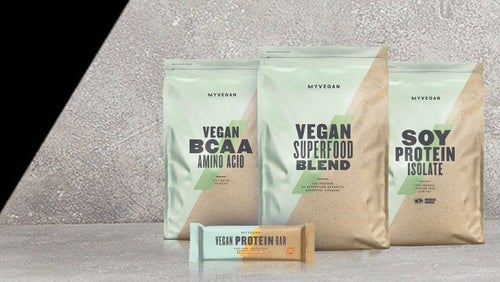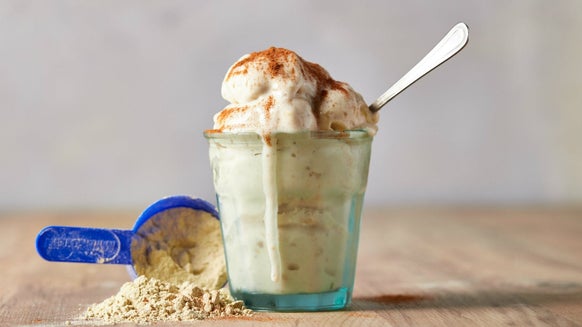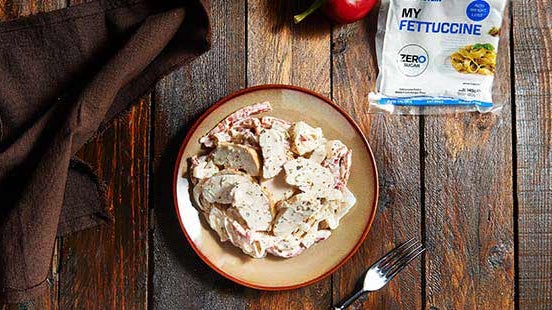
Von: Damian N. Minichowski
Eiweiß in der Diät: 5 Gründe, wieso du dich eiweißreich ernähren solltest
- Grund Nr. 1: Bessere Fettverbrennung
- Grund Nr. 2: Mehr Sättigung, weniger Appetit
- Grund Nr. 3: Mehr Muskeln, mehr Körperkraft
- Grund Nr. 4: Besserer Muskelschutz
- Grund Nr. 5: Für starke Knochen
- Abschließende Worte
Grund Nr. 1: Bessere Fettverbrennung

- Wenn du 100 Kilokalorien in Form von Fett aufnimmst, kann der Körper 98 % davon effektiv – nach Abzug der Verdauungskosten – nutzen.
- Wenn du 100 Kilokalorien in Form von Kohlenhydraten aufnimmst, kann der Körper 85-95 % davon effektiv – nach Abzug der Verdauungskosten – nutzen.
- Wenn du dagegen 100 Kilokalorien in Form von Proteinen aufnimmst, kann der Körper lediglich 70-80 % davon effektiv – nach Abzug der Verdauungskosten – nutzen.
Wie stark ist der Effekt?
Grund Nr. 2: Mehr Sättigung, weniger Appetit

senkt die Konzentration des Hungerhormons Ghrelin [2][4] erhöht die Konzentration des Sättigungshormons Peptid YY [3][4]
Grund Nr. 3: Mehr Muskeln, mehr Körperkraft
- Ausdauersportler sollten bei 1,4-1,6g Protein pro Kilogramm Körpergewicht liegen.
- Kraftsportler und Bodybuilder dagegen bei 1,6-2g Protein pro Kilogramm Körpergewicht.
- Befindest du dich in der Diät, kannst du sogar bis auf 2,5g/kg hochgehen.
Grund Nr. 4: Besserer Muskelschutz

Grund Nr. 5: Für starke Knochen
Abschließende Worte


Top 10 der besten veganen Proteinquellen

[1] Halton, TL. / Hu, FB. (2004): The effects of high protein diets on thermogenesis, satiety and weight loss: a critical review. In: J Am Coll Nutr. URL: http://www.ncbi.nlm.nih.gov/pubmed/15466943.
[2] Blom, WA., et al. (2006): Effect of a high-protein breakfast on the postprandial ghrelin response. In: Am J Clin Nutr. URL: http://www.ncbi.nlm.nih.gov/pubmed/16469977.
[3] Batterham, RL., et al. (2006): Critical role for peptide YY in protein-mediated satiation and body-weight regulation. In: Cell Metabolism. URL: http://www.sciencedirect.com/science/article/pii/S1550413106002713.
[4] Lomenick, JP., et al. (Effects of Meals High in Carbohydrate, Protein, and Fat on Ghrelin and Peptide YY Secretion in Prepubertal Children. In: J Clin Endocrinol Metab. URL: http://press.endocrine.org/doi/abs/10.1210/jc.2009-0949.
[5] Weigle, DS., et al. (A high-protein diet induces sustained reductions in appetite, ad libitum caloric intake, and body weight despite compensatory changes in diurnal plasma leptin and ghrelin concentrations. In: Am J Clin Nutr. URL: http://ajcn.nutrition.org/content/82/1/41.long.
[6] Minichowski, DN. (2012): …wenn die Logik nicht greift – Teil III: Eine Kalorie ist eine Kalorie. In: AesirSports.de. URL: http://aesirsports.de/2012/06/wenn-die-logik-nicht-greift-teil-iii-eine-kalorie-ist-eine-kalorie/.
[7] Jequier, E. (2002): Pathways to obesity. In: International Journal of Obesity and Related Metabolic Disorders. URL: http://www.ncbi.nlm.nih.gov/pubmed/12174324 .
[8] Johnston, CS. / Day, CS. / Swan, PD. (2002): Postprandial thermogenesis is increased 100% on a high-protein, low-fat diet versus a high-carbohydrate, low-fat diet in healthy, young women. In: J Am Coll Nutr. URL: http://www.ncbi.nlm.nih.gov/pubmed/11838888.
[9] Veldhorst, MA. / Westerterp-Plantenga, MS. / Plantenga, KR. (2009): Gluconeogenesis and energy expenditure after a high-protein, carbohydrate-free diet. In: Am J Clin Nutr. URL: http://www.ncbi.nlm.nih.gov/pubmed/19640952.
[10] Veldhorst, MA., et al. (2010): Presence or absence of carbohydrates and the proportion of fat in a high-protein diet affect appetite suppression but not energy expenditure in normal-weight human subjects fed in energy balance. In: Br J Nutr. URL: http://www.ncbi.nlm.nih.gov/pubmed/20565999 .
[11] Bray, GA., et al. (2015): Effect of protein overfeeding on energy expenditure measured in a metabolic chamber. In: Am J Clin Nutr. URL: http://ajcn.nutrition.org/content/early/2015/01/14/ajcn.114.091769.abstract.
[12] Leidy, HJ., et al. (2011): The effects of consuming frequent, higher protein meals on appetite and satiety during weight loss in overweight/obese men. In: Obesity. URL: http://www.ncbi.nlm.nih.gov/pubmed/20847729.
[13] Bosse, JD. / Dixon, BM. (2012): Dietary protein to maximize resistance training: a review and examination of protein spread and change theories. In: J Int Soc Sports Nutr. URL: http://www.jissn.com/content/9/1/42/abstract.
[14] Pasiakos, SM. / McLellan, TM. / Lieberman, HR. (2015): The effects of protein supplements on muscle mass, strength, and aerobic and anaerobic power in healthy adults: a systematic review. In: Sports Med. URL: http://www.ncbi.nlm.nih.gov/pubmed/25169440.
[15] Mettler, S. / Tipton, MN. (2010): Increased protein intake reduces lean body mass loss during weight loss in athletes. In: Med Sci Sports Exerc. URL: http://europepmc.org/abstract/MED/19927027.
[16] Helms, ER. / Aragon, AA. / Fitschen, PJ. (2014): Evidence-based recommendations for natural bodybuilding contest preparation: nutrition and supplementation. In: J Int Soc Sports Nutr. URL: www.jissn.com/content/11/1/20.
[17] Helms, ER., et al. (2014): A systematic review of dietary protein during caloric restriction in resistance trained lean athletes: a case for higher intakes. In: Int J Sports Nutr Exerc Metab. URL: http://www.ncbi.nlm.nih.gov/pubmed/24092765.
[18] Bonjour, JP. (2005): Dietary protein: an essential nutrient for bone health. In: J Am Coll Nutr. URL: http://www.ncbi.nlm.nih.gov/pubmed/16373952.
[19] Kerstetter, JE. / Kenny, AM. / Insogna, KL. (2011): Dietary protein and skeletal health: a review of recent human research. In: Curr Opin Lipodol. URL: http://www.ncbi.nlm.nih.gov/pubmed/21102327.
[20] Rizzoli, R. / Bonjour, JP. (2004): Dietary Protein and Bone Health. In: J BMR. URL: http://onlinelibrary.wiley.com/doi/10.1359/JBMR.040204/full.
[21] Hannan, MT., et al. (2000): Effect of Dietary Protein on Bone Loss in Elderly Men and Women: The Framingham Osteoporosis Study. In: J BMR. URL: http://onlinelibrary.wiley.com/doi/10.1359/jbmr.2000.15.12.2504/full.
[22] Munger, RG. / Cerhan, JR. / Chiu, BCH. (1999): Prospective study of dietary protein intake and risk of hip fracture in postmenopausal women. In: Am J Clin Nutr. URL: http://ajcn.nutrition.org/content/69/1/147.short.
[23] Manninen, AH. (2005): High-protein diets are not hazardous for the healthy kidneys. In: Nephr Dial Transpl. URL: http://ndt.oxfordjournals.org/content/20/3/657.full.
[24] Martin, WF. / Armstrong, LE. / Rodriguez, NR. (2005): Dietary protein intake and renal function. In: Nutr Metab. URL: http://www.nutritionandmetabolism.com/content/2/1/25.
[25] Manninen, AH. (2004): High-Protein Weight Loss Diets and Purported Adverse Effects: Where is the Evidence? In: J Int Soc Sports Nutr. URL: http://www.jissn.com/content/1/1/45.










